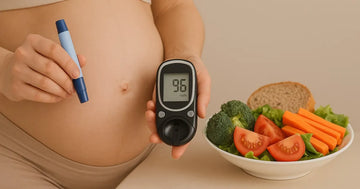Image Credit: AI
Gestational diabetes affects up to 10% of pregnancies, making it a common concern for expecting mothers. It happens when blood sugar levels rise during pregnancy, even if they were previously normal. The good news? With the right care, you can still have a healthy pregnancy and baby. For most women, blood sugar levels return to normal after childbirth.
Also read: Pregnancy Diet Chart For Second Trimester
Symptoms Of Diabetes During Pregnancy
Some symptoms can be easy to miss. If you notice any of these signs, speak with your doctor. They may recommend a blood test or urine analysis to confirm.
- Constantly feeling tired and having blurred vision
- Persistent dry mouth or increased thirst
- Frequent urination
What Causes Gestational Diabetes?
As pregnancy progresses, hormones from the placenta may interfere with how your body processes insulin. If your body can’t make enough insulin to meet the increased demand, blood sugar levels rise, leading to gestational diabetes.
Your chances of developing it may go up if:
- You have a family history of diabetes.
- You had a higher body weight before pregnancy.
- You've had gestational diabetes in a previous pregnancy.
Risk Of Gestational Diabetes
Most women with gestational diabetes go on to have healthy babies, especially when it’s detected early and managed well. But if left unchecked, high blood sugar can pass through the placenta and affect the baby. Possible risks include:
- Excess amniotic fluid.
- A higher chance of needing a C-section.
- A larger baby may cause complications during delivery.
- In rare cases, it may slightly increase the risk of miscarriage.
Can Gestational Diabetes Be Prevented?
There’s no guaranteed way to prevent it, especially if genetics play a role. But you can reduce your risk with healthy lifestyle habits:
- Choose nutritious foods, including whole grains, fruits, and vegetables. Keep sugary drinks and treats to a minimum.
- Stay active—regular movement helps manage blood sugar levels.
- Monitor weight gain according to your doctor’s recommendations.
- Prioritize rest, reduce stress, and nurture your mental well-being.
Foods To Avoid With Gestational Diabetes
To manage your blood sugar, limit:
- Sugary beverages
- Foods high in refined carbohydrates—like white rice, potatoes, and white bread
- Sweets and desserts
How Is Gestational Diabetes Diagnosed?
Most doctors check for gestational diabetes in the third trimester.
- A urine test checks sugar levels in your urine.
- A fasting plasma glucose test may be recommended if your risk is low.
- A Glucose Tolerance Test (GTT) is done after overnight fasting. Your blood sugar is measured while fasting, one hour, and two hours after drinking a glucose solution. This helps assess how your body processes sugar and whether there are risks for your baby.
Treatment For Gestational Diabetes
The best way to treat it is by eating right and getting exercise during pregnancy. Your doctor will want to keep a closer watch if she thinks you will not be able to control it with diet & exercise.
Your doctor may order additional ultrasound scans to check on the baby's growth & the amniotic fluid. She will also ask you to monitor your baby’s movements closely. If you feel your baby isn't moving as much at any point in time, let your doctor know immediately. In some cases, your doctor may recommend insulin injections to manage your blood sugar.
Also Read: How To Dress For Your Pregnancy Scans
Conclusion
Pregnancy is a special phase and can be beautiful and stress-free if you manage your health well. Gestational diabetes typically resolves after childbirth, but follow-up testing is important. The health of both you and your baby is affected if you don’t track your blood sugar levels during pregnancy. Maintain a low-sugar diet, stay active, and do a little exercise if possible. You can begin following the tips shared in this blog to have a safe and happy pregnancy. We at Morph Maternity wish you a happy pregnancy.
Disclaimer:
This content is for informational purposes only and should not be considered a substitute for professional medical advice, diagnosis, or treatment. Always consult your doctor or a qualified healthcare provider with any questions you may have regarding a medical condition or pregnancy-related concerns.
Shop all Morph essentials, including maternity incontinence panties, for an extra 10% off using code "HEALTHYBABY."






























































Managing diabetes during pregnancy is crucial for the health of both mother and baby. Key steps include monitoring blood sugar, eating a balanced diet, staying active, and consulting doctors for proper care. FIMS Hospital, the Best Gynaecology hospital in Sonipat, offers expert support. For details, visit our website https://www.fimssonipat.com/ or call +91-130-2205000.